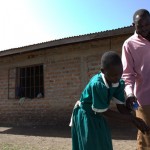Source – WASHfunders Blog, Aug 17, 2012
Editor’s Note: This guest post was authored by Malaika Cheney-Coker, the learning and influencing advisor of the Water Team at CARE USA. Her work includes support on internal and external communications, the application and use of monitoring and evaluation tools, and technical guidance on learning strategies and activities within partnership programs of the Water Team. In this post, Malaika discusses the implications of a school WASH project study on action-research projects.
In the summer of 2007, SWASH+, a school WASH project in Nyanza Province, Kenya, with a large and complex research operation, conducted a small study. The study was a simple identification of the recurrent costs needed to pay for materials and for labor to maintain and repair water containers, stands, taps, and to re-purchase soap and water purification items. Very different from the larger randomized controlled trials and studies being conducted by the project, this study cost little and did not require a large research team (it was conducted by a graduate student over the course of a summer) or complex design and analysis. However, the findings of this simple cost research were immediately adopted by the Ministry of Education and resulted in a doubling of the Ministry’s Free Primary Education allotment for electricity, water, and conservancy — a budget line item that schools have traditionally used to pay for WASH costs.

Parent volunteer helps monitor school WASH conditions by ensuring soapy water is available for hand-washing, drinking water is treated, and latrines are clean. Credit: CARE / Brendan Bannon, Kenya, 2012
From this experience, the SWASH+ team gained some important insights into how action-research projects can achieve results:
- Various forms of inquiry are needed to produce and buttress an evolving story. The simple study on WASH costs was a logical next step after a study on the sustainability of a safe water systems pilot in 55 schools identified adequate financing as one of four domains of sustainability. A problem tree analysis also identified inadequate or poorly planned financing as a key threat to sustainability. Similarly, SWASH+ findings from a randomized controlled trial on the effects of school WASH on pupil absence provided evidence for one of the potential impacts of improved school WASH (an average of six days less of absence for school girls) and helped make the case for increasing investments in school WASH.
- Research needs to be made available to policymakers in practical terms. The budget for operations costs drafted by SWASH+ offered specific and practical recommendations that could be more readily adopted than a general injunction to the Ministry of Education to increase its funding.
- To make research available in practical terms, action-research organizations need to be adept at canvassing entry points and opportunities for influence. A SWASH+ review of the national school WASH strategy draft revealed that the cost estimates related to school WASH seemed arbitrary. By having had cultivated relationships within the Ministry, SWASH+ was able to point this out and suggest that these numbers be revised using figures provided by the research.
- Action-research is an iterative process. While the Ministry of Education endorsed the budget amount for WASH operations provided by SWASH+, it later asked that these costs be expressed as a percentage of the total budget allotment to schools. In addition, the initial research only looked at operations costs for WASH and not maintenance costs for infrastructure repairs. Further research will be needed to address these issues.
Through this experience, the SWASH+ team concluded that by their very definition, action-research projects must be agile and resourceful. Rigorous studies are needed for an evidence base that can be credible to policymakers and present a compelling argument for change. Yet rigorous methods, such as randomized controlled trials or longitudinal studies, can be costly and take years to execute. They are not always responsive to opportunities for influence in the here and now. When the main objective is influence, rather than the accumulation of evidence, action-research projects should use all means at their disposal, including relationship building, advocacy, smaller non-experimental research studies, and audience-sensitive interpretation of research results, to get the attention of those able to catalyze widespread change.
Learn more about SWASH+ research at our new website. Highlights of the site include journal publications and summaries, photo and video galleries, and other helpful resources.



